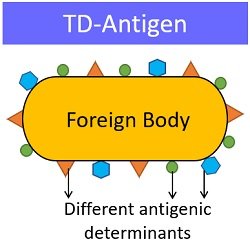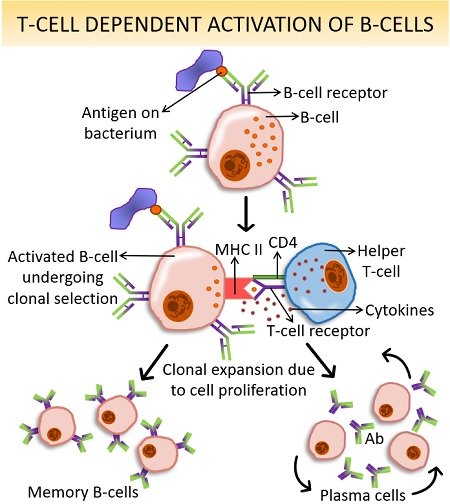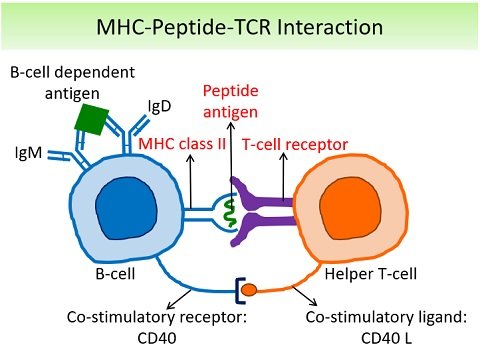Thymus dependent antigens are also called “T cell-dependent antigens” or “TD-Ags”. These are immunogens that induce antibody’s formation. It is one of the types of B-cell antigen.
Naturally occurring antigens are T-cell dependent. Thymus dependent antigens are complex in nature. They are multideterminant antigens due to different epitopes on a cell surface.
T-cell recognizes some of the epitopes, while the B-cell identifies the others. Thymus dependent antigens generate an immune response via the association of helper T-cells.
Thus, they cannot stimulate the antibodies production alone. TD-Ags depend upon factors (cytokines) released by Th-cells. And cytokines are necessary to generate an immune response.
This post describes the meaning and key points of thymus-dependent antigens. Also, you will get to know the process of the thymus-dependent activation of B-cells.
Content: Thymus Dependent Antigens
Meaning of Thymus Dependent Antigens
Thymus dependent antigens (TD-Ags) induce antibodies formation through the association of follicular Th-cells. For this reason, such antigens are called thymus or T-cell dependent. Most of the TD-Ags are protein antigens. The characteristic feature of TD-Ags is the presence of copies of different epitopes.

The table below illustrates some of the characteristic properties of thymus-dependent antigens.
| Properties | T-Cell Dependent Antigens |
|---|---|
| T-cell participation | They require cooperation of helper T-cells |
| Chemical nature | The majority of them are soluble proteins |
| Degradability | Easily degradable |
| Antibody Response | |
| Complement activation | No |
| Isotype switching | Yes |
| Affinity maturation | Yes |
| Immunologic memory | Yes |
| Polyclonal activation | No |
| Effect on antibody production | Full range, IgM, IgG, IgA and IgE |
T-Cell Dependent Activation of B-Cells
The summary of T-cell dependent activation of B-cell is given hereunder:

1. Interaction of TD-Antigen with Specific BCR
B-cell is one of the special antigen-presenting cells. It carries B cell receptors (BCRs) or transmembrane proteins over its surface. The BCR complex comprises of:
- Antigen-binding mIg: It is a membrane-bound immunoglobulin molecule.
- Signal transduction moiety: It contains Ig-α/Ig-β heterodimer.
TD-antigens bind to mIgs on B-cell surface. This binding leads to cause crosslinking of mIg and generates signal 1. It results in the expression of MHC class II molecules and costimulatory B7 protein.
2. Internalization of TD-Antigen
After that, internalization of the antigen-mIg complex occurs via RME or receptor-mediated endocytosis. Through RME, B-cells endocytose antigen by the invagination of the plasma membrane.
Internalized components remain in the vesicular compartment, not in the cytoplasm. As in receptor-mediated endocytosis, BCRs form vesicles containing the absorbed substances.
3. Fusion with Lysosomes
Then, a lysosome or a membrane-bound cell organelle fuses with these vesicles. It contains digestive or hydrolytic enzymes to degrade foreign bodies. After fusion, lysosomal proteases process the protein antigens into peptide fragments.
4. Expression of MHC Class-II Molecules
Afterwards, peptide fragments interact with MHC class II molecules. Peptide-MHC complexes emerge on the B-cell surface.
5. MHC-Peptide-TCR Interaction
This interaction activates CD4+ cells plus the costimulatory B7-CD28 signal. The MHC-peptide complex reacts with TCRs of helper T-cells (CD4+ cells). T-cell is a white blood cell and performs functions like:
- A key mediator of immune function.
- Produce immune responses by producing factors that can stimulate B-cell.
T and B cell conjugation up-regulates CD40L (a membrane protein) expression. Later, CD40L interacts with CD40 on B cells. As a result, the binding produces signal 2 for B-cell activation.

6. Cytokine Release & Antibody Production
Meanwhile, MHC-peptide-TCR interaction releases cytokine (IL-4) from T-cells in a directed manner. Further, it sends signals that direct B-cell proliferation and maturation. B-cell differentiates into:
- Memory B cells provide a second level of protection against re-exposure to pathogens.
- Plasma cells are mature B-lymphocytes that produce specific Abs (antibodies).
- Abs first bind with the antigenic site.
- Later, they neutralize the effect of the antigen.
Key Points
1. Thymus dependent antigens induce T-cell dependent responses. They do not elicit a reproducible antibody response by B-cells alone. Until and unless the B-cell receives signals from CD4+ T-cells. Antigen interaction involves TCR, Ag and MHC molecules.
TCR or T-cell receptor
- It is a protein complex that recognizes specific antigenic fragments.
- It is a heterodimer containing two diverse protein chains.
- TCRs belong to the immunoglobulin superfamily.
- They take part in binding, recognition and adhesion.
Antigen
- Ag is an acronym for antigen.
- It is a foreign body that carries distinct epitopes.
- B-cells produce antibodies against particular antigens encountered within the body.
- Antigen-binding sites (paratopes) of antibodies interact with specific epitopes to trigger immune responses.
MHC
- Major histocompatibility complex (MHC) molecules are present on special antigen-presenting cells.
- In thymus-dependent B-cell activation, MHC Class-II molecules present antigenic fragments to the Th-cell.
2. T-cell dependent activation of B-cells generally has three sequential stages.
- Binding and processing of antigen
- MHC-peptide-TCR interaction
- Stimulation of B-cells to produce plasma and memory cells
3. B-cell response to a protein antigen is usually thymus-dependent. The majority of thymus-dependent antigens are soluble proteins. Soluble protein antigens interact with membrane-bound immunoglobulin on the B-cell surface. Later, they are internalized, processed, and displayed as peptide-MHC-II complexes.
4. TD-Ags need cytokine support. Helper or CD4+ T-cells release cytokines (cell signalling molecules).
5. In thymus-dependent B-cell activation, they stimulate B-cell growth and differentiation. B-cell differentiates into mature plasma cells or triggers antibody production.
6. Interaction between CD40 on B-cells and CD40 Ligand on Th-cells produce antibodies. Here, CD stands for “Cluster of differentiation”.
- CD-40 is a costimulatory protein on the APCs (like B-cells). It becomes active once the CD40 Ligand on the T-cell interacts.
- CD40 Ligand or CD154 is a member of the TNF superfamily. It is a costimulatory molecule on the CD4+ T-cells. It exists in a soluble form. CD40 Ligand helps in B-cell maturation. Also, it helps B cells to produce long-lived plasma cells and memory B cells.
Conclusion
Thus, T-dependent antigens stimulate B-cells only through the help of special CD4+ cells. Such antigens need cytokine cooperation from helper T cells. So, antigens that need T-cell support for B cell activation are thymus-dependent antigens.